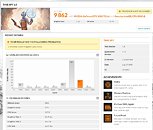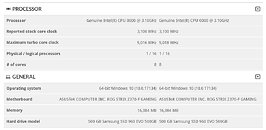- Joined
- Oct 9, 2007
- Messages
- 47,854 (7.38/day)
- Location
- Dublin, Ireland
| System Name | RBMK-1000 |
|---|---|
| Processor | AMD Ryzen 7 5700G |
| Motherboard | Gigabyte B550 AORUS Elite V2 |
| Cooling | DeepCool Gammax L240 V2 |
| Memory | 2x 16GB DDR4-3200 |
| Video Card(s) | Galax RTX 4070 Ti EX |
| Storage | Samsung 990 1TB |
| Display(s) | BenQ 1440p 60 Hz 27-inch |
| Case | Corsair Carbide 100R |
| Audio Device(s) | ASUS SupremeFX S1220A |
| Power Supply | Cooler Master MWE Gold 650W |
| Mouse | ASUS ROG Strix Impact |
| Keyboard | Gamdias Hermes E2 |
| Software | Windows 11 Pro |
Some of the first benchmark numbers of Intel's upcoming 8-core/16-thread socket LGA1151 processor, the Core i9-9900K, surfaced, from Thai professional overclocker TUM APISAK. A 3DMark database submission sees the processor score 10,719 points in the CPU tests, with an overall score of 9,862 points, when paired with a GeForce GTX 1080 Ti graphics card. According to WCCFTech, the CPU score is about 2,500 points higher than the 6-core/12-thread Core i7-8700K, and about 1,500 points higher than the 8-core/16-thread AMD Ryzen 7 2700X. The tested processor features 8 cores, 16 threads, a nominal clock of 3.10 GHz, and boost frequency of 5.00 GHz, as measured by 3DMark's internal SysInfo module. Intel is expected to launch the Core i9-9900K on 1st August, 2018.


View at TechPowerUp Main Site


View at TechPowerUp Main Site






